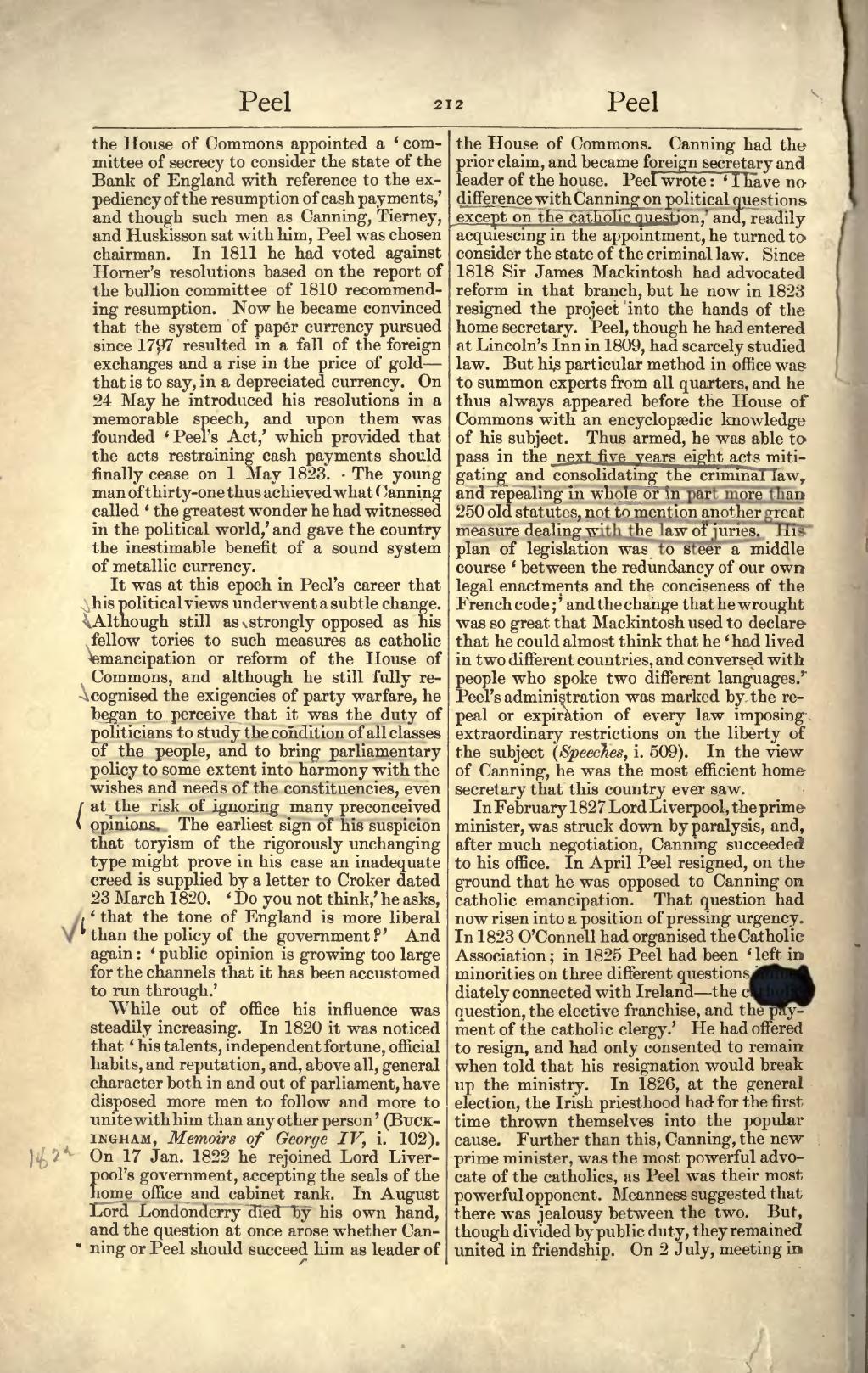the House of Commons appointed a ‘committee of secrecy to consider the state of the Bank of England with reference to the expediency of the resumption of cash payments,’ and though such men as Canning, Tierney, and Huskisson sat with him, Peel was chosen chairman. In 1811 he had voted against Horner's resolutions based on the report of the bullion committee of 1810 recommending resumption. Now he became convinced that the system of paper currency pursued since 1797 resulted in a fall of the foreign exchanges and a rise in the price of gold—that is to say, in a depreciated currency. On 24 May he introduced his resolutions in a memorable speech, and upon them was founded ‘Peel's Act,’ which provided that the acts restraining cash payments should finally cease on 1 May 1823. The young man of thirty-one thus achieved what Canning called ‘the greatest wonder he had witnessed in the political world,’ and gave the country the inestimable benefit of a sound system of metallic currency.
It was at this epoch in Peel's career that his political views underwent a subtle change. Although still as strongly opposed as his fellow tories to such measures as catholic emancipation or reform of the House of Commons, and although he still fully recognised the exigencies of party warfare, he began to perceive that it was the duty of politicians to study the condition of all classes of the people, and to bring parliamentary policy to some extent into harmony with the wishes and needs of the constituencies, even at the risk of ignoring many preconceived opinions. The earliest sign of his suspicion that toryism of the rigorously unchanging type might move in his case an inadequate creed is supplied by a letter to Croker dated 23 March 1820. ‘Do you not think,’ he asks, ‘that the tone of England is more liberal than the policy of the government?’ And again: ‘public opinion is growing too large for the channels that it has been accustomed to run through.’
While out of office his influence was steadily increasing. In 1820 it was noticed that ‘his talents, independent fortune, official habits, and reputation, and, above all, general character both in and out of parliament, have disposed more men to follow and more to unite with him than any other person’ (Buckingham, Memoirs of George IV, i. 102). On 17 Jan. 1822 he rejoined Lord Liverpool's government, accepting the seals of the home office and cabinet rank. In August Lord Londonderry died by his own hand, and the question at once arose whether Canning or Peel should succeed him as leader of the House of Commons. Canning had the prior claim, and became foreign secretary and leader of the house. Peel wrote: ‘I have no difference with Canning on political questions except on the catholic question,’ and, readily acquiescing in the appointment, he turned to consider the state of the criminal law. Since 1818 Sir James Mackintosh had advocated reform in that branch, but he now in 1823 resigned the project into the hands of the home secretary. Peel, though he had entered at Lincoln's Inn in 1809, had scarcely studied law. But his particular method in office was to summon experts from all quarters, and he thus always appeared before the House of Commons with an encyclopædic knowledge of his subject. Thus armed, he was able to pass in the next five years eight acts mitigating and consolidating the criminal law, and repealing in whole or in part more than 250 old statutes, not to mention another great measure dealing with the law of juries. His plan of legislation was to steer a middle course ‘between the redundancy of our own legal enactments and the conciseness of the French code;’ and the change that he wrought was so great that Mackintosh used to declare that he could almost think that he ‘had lived in two different countries, and conversed with people who spoke two different languages.’ Peel's administration was marked by the repeal or expiration of every law imposing extraordinary restrictions on the liberty of the subject (Speeches, i. 509). In the view of Canning, he was the most efficient home secretary that this country ever saw.
In February 1827 Lord Liverpool, the prime minister, was struck down by paralysis, and, after much negotiation, Canning succeeded to his office. In April Peel resigned, on the ground that he was opposed to Canning on catholic emancipation. That question had now risen into a position of pressing urgency. In 1823 O'Connell had organised the Catholic Association; in 1825 Peel had been ‘left in minorities on three different questions immediately connected with Ireland—the catholic question, the elective franchise, and the payment of the catholic clergy.’ He had offered to resign, and had only consented to remain when told that his resignation would break up the ministry. In 1826, at the general election, the Irish priesthood had for the first time thrown themselves into the popular cause. Further than this, Canning, the new prime minister, was the most powerful advocate of the catholics, as Peel was their most powerful opponent. Meanness suggested that there was jealousy between the two. But, though divided by public duty, they remained united in friendship. On 2 July, meeting in
